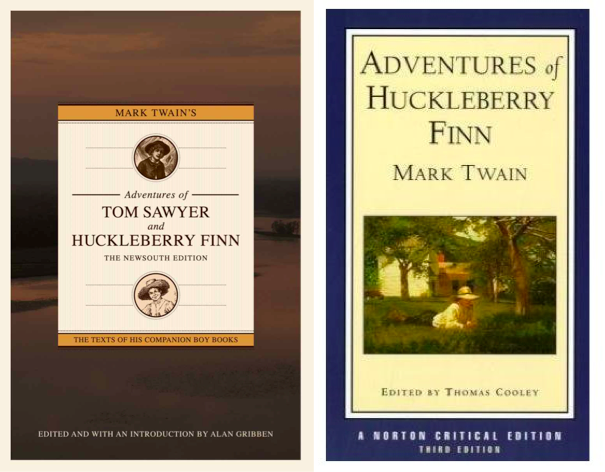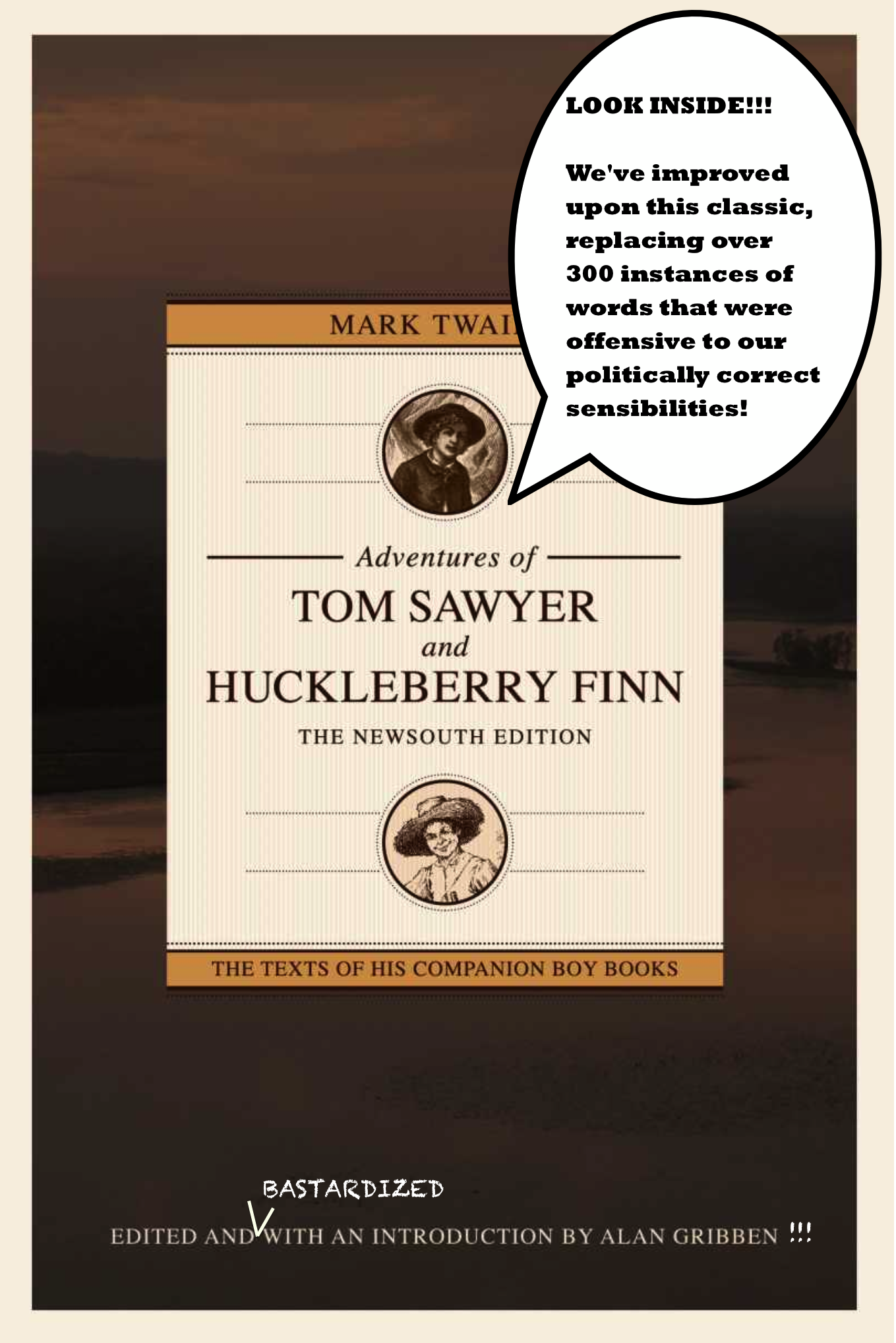
Image Credits: Amazon.com
In researching and writing my last blog posting, which sought to explore the possible dangers associated with the expurgation of the literary classics we use in the school setting, I found myself digging a little deeper into a story from a couple of years ago that I was only vaguely familiar with. In that last posting, I focused upon the ways in which e-books were, by the nature of the medium, particularly susceptible to modification and/or censorship. But these concerns are not ones we should only ascribe to the digital; I wanted to demonstrate that modification of canonical works for the purpose of “protecting” people from any content that might be unpleasant to the modern reader’s sensibilities can and does happen with our “old-fashioned” paper textbooks, too.
With that intent in mind, I mentioned an incident a couple of years ago where a publisher put together an edition of “Huckleberry Finn” specifically intended for classroom use that had been substantively edited from cover-to-cover. To wit: NewSouth Books saw it fit to publish a copy of the American classic “Adventures of Huckleberry Finn” that had been modified roughly 300 times by “Mark Twain expert” Dr. Alan Gribben. Gribben took it upon himself to rewrite “Adventures of Huckleberry Finn” by replacing every instance of the word “nigger” with “slave,” “injun” with “Indian,” and “half-breed” with “half-blood” (cite).
Dr. Gribben, (who, incidentally, was a professor for nearly two decades at UT, a fact about which we should all be proud) composed an introduction to this new version of Twain’s masterpiece wherein he attempts to justify his rewriting; a portion of this Introduction is available on the publisher’s website. NewSouth describes Dr. Gribben’s introduction as one that “eloquently develops” the “bold move compassionately advocated by Gribben” to sanitize the book in a way that Gribben didn’t find so personally offensive.
Reading this introduction is nothing short of amazing in the arrogance, hypocrisy, and short-sightedness it depicts. To mention just one the introduction’s many stand-out moments (it would be impossible to go through them all), Dr. Gribben attempts to justify his decision to rewrite Twain’s canonical work by lamenting the “occasional efforts of rap and hip-hop musicians to appropriate [the N-Word].” The person who felt they were within their rights in determining how the “N-Word” can and cannot be used in classic literature is simultaneously wagging his finger at two overwhelmingly African-American genres of music for “appropriating” that word?
Seriously?
Frighteningly, Dr. Gribben created the new version of Twain with the specific intent that his rendition of Twain would be more appropriate in the context of the classroom. Apparently, maintaining literary integrity is not worth the White Guilt that comes along with remembering this shameful chapter of the past.
Even more frightening is the fact that there is no way the typical reader would know from looking at the textbook that it was anything other than Mark Twain’s words, as he wrote them. Neither Dr. Gribben nor NewSouth Publishing is making any effort to make the reader aware that what they are purchasing/studying/assuming to be authentic. A side-by-side comparison of NewSouth’s edited version and what is arguably the definitive version of the book can be found at the top of this post.
Is there anything that would make it obvious to any reader- much less a student- that the author’s text is respected in one, and revised in the other? It is precisely because the book is designed such that it could easily be mistaken for the Real McCoy that the actions of Dr. Gribben and NewSouth are so contemptible and dangerous. Below, I've suggested some edits to NewSouth's present cover that would help eliminate reader confusion between the altered and authentic versions. Even if the damage has already been done with NewSouth's first literary miscarriage, they will have a chance to do right when their follow-up edition is published. I, for one, can't wait to see all of the new things they decided to rewrite since the first edition!
I encourage you to read excerpts of Gribben’s introduction, which I’ve linked to a bunch of times in the above post-turned-rant. Excerpts from Dr. Gribben’s introduction to the publication of the classic American novel he saw himself fit to revise are so jaw-dropping in their hypocrisy that it is truly hard to believe that he’s being serious. It’s too bad that he was, because, had he had his tongue in his check, Dr. Gribben’s words would constitute the sort of satire and racial commentary that Twain himself might’ve been impressed by.

Comments
In two instances you've
In two instances you've mischaracterized Dr. Gribben's intentions here.
You wrote that Gribben published this edited edition such to create a volume he didn't find "personally offensive"; as Gribben has stated in his introduction and elsewhere, Gribben's initiative didn't involve his personal feelings about the language in the book. Rather his interest in publishing this volume was for meeting a need suggested to him by actual high school teachers who wanted to teach Twain's books in their classrooms, but were themselves forbidden to do so by concerned administrators or parents. Gribben isn't offended by Twain's language; he's trying to help teachers get Twain back into the classroom after it's been "banned by omission" by school boards.
Second, you state that Gribben created this volume because he believed "his rendition of Twain would be more appropriate in the context of the classroom." Again, this is false. Gribben, a Twain scholar who's taught these works himself, has no compunction against the unedited version of Twain's works being taught in classrooms; his edited volumes are for teachers who feel an edited version is necessary for their specific classrooms. Gribben is making no judgment that this is a more "appropriate" version of these books; instead he's published these volumes to offer another option for teachers who might want them.
There's nothing wrong with disagreeing with the publication of these books or how they should be used, but one should be careful not to ascribe nefarious intentions where none exist.